In-soo Kim
Meta-Heuristic Fronthaul Bit Allocation for Cell-free Massive MIMO Systems
Mar 28, 2024Abstract:Limited capacity of fronthaul links in a cell-free massive multiple-input multiple-output (MIMO) system can cause quantization errors at a central processing unit (CPU) during data transmission, complicating the centralized rate optimization problem. Addressing this challenge, we propose a harmony search (HS)-based algorithm that renders the combinatorial non-convex problem tractable. One of the distinctive features of our algorithm is its hierarchical structure: it first allocates resources at the access point (AP) level and subsequently optimizes for user equipment (UE), ensuring a more efficient and structured approach to resource allocation. Our proposed algorithm deals with rigorous conditions, such as asymmetric fronthaul bit allocation and distinct quantization error levels at each AP, which were not considered in previous works. We derive a closed-form expression of signal-to-interference-plusnoise ratio (SINR), in which additive quantization noise model (AQNM) based distortion error is taken into account, to define the mathematical expression of spectral efficiency (SE) for each UE. Also, we provide analyses on computational complexity and convergence to investigate the practicality of proposed algorithm. By leveraging various performance metrics such as total SE and max-min fairness, we demonstrate that the proposed algorithm can adaptively optimize the fronthaul bit allocation depending on system requirements. Finally, simulation results show that the proposed algorithm can achieve satisfactory performance while maintaining low computational complexity, as compared to the exhaustive search method
Gridless Channel Estimation for MmWave Hybrid Massive MIMO Systems with Low-Resolution ADCs
Jul 13, 2022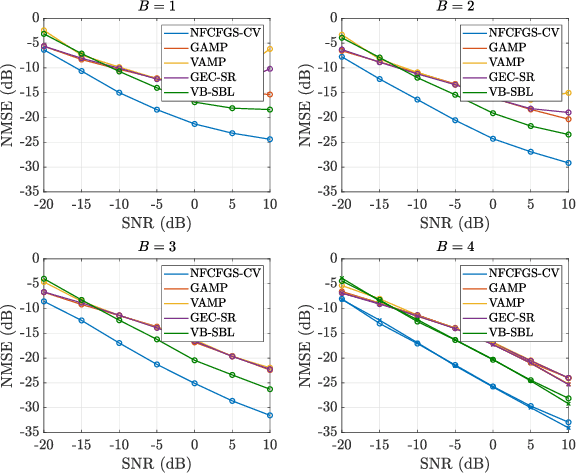
Abstract:This paper proposes the Newtonized fully corrective forward greedy selection-cross validation-based (NFCFGS-CV-based) channel estimator for millimeter (mmWave) hybrid massive multiple-input multiple-output (MIMO) systems with low-resolution analog-to-digital converters (ADCs). The proposed NFCFGS algorithm is a gridless compressed sensing (CS) technique that combines the FCFGS and Newtonized orthogonal matching pursuit (NOMP) algorithms. In particular, NFCFGS performs single path estimation over the continuum at each iteration based on the previously estimated paths. The CV technique is adopted as an indicator of termination in the absence of the prior knowledge on the number of paths, which is a model validation technique that prevents overfitting.
* to appear in SSP 2021, Rio de Janeiro, Brazil
Bayesian Channel Estimation for Intelligent Reflecting Surface-Aided mmWave Massive MIMO Systems With Semi-Passive Elements
Jun 14, 2022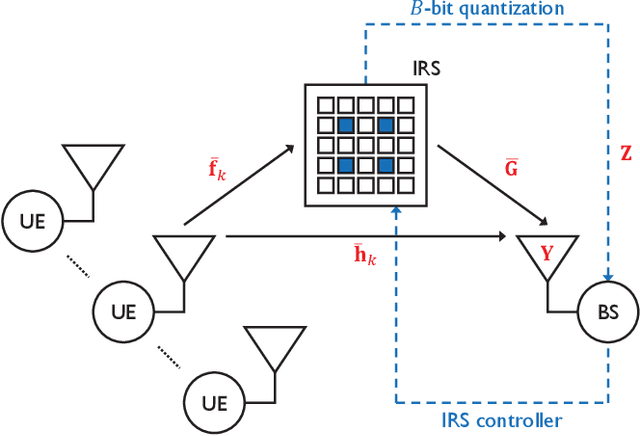
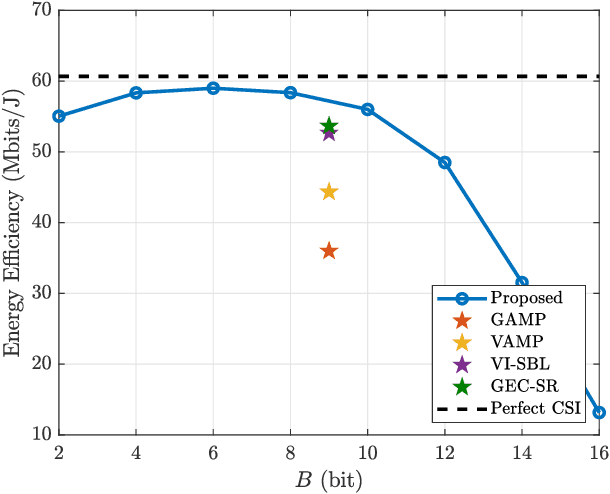

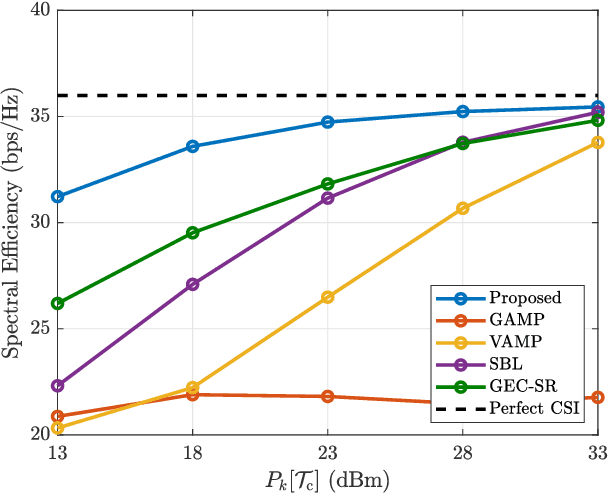
Abstract:In this paper, we propose a Bayesian channel estimator for intelligent reflecting surface-aided (IRS-aided) millimeter wave (mmWave) massive multiple-input multiple-output (MIMO) systems with semi-passive elements that can receive the signal in the active sensing mode. Ultimately, our goal is to minimize the channel estimation error using the received signal at the base station and additional information acquired from a small number of active sensors at the IRS. Unlike recent works on channel estimation with semi-passive elements that require both uplink and downlink training signals to estimate the UE-IRS and IRS-BS links, we only use uplink training signals to estimate all the links. To compute the minimum mean squared error (MMSE) estimates of all the links, we propose a novel variational inference-sparse Bayesian learning (VI-SBL) channel estimator that performs approximate posterior inference on the channel using VI with the mean-field approximation under the SBL framework. The simulation results show that VI-SBL outperforms the state-of-the-art baselines for IRS with passive reflecting elements in terms of the channel estimation accuracy, training overhead, and spectral efficiency. Furthermore, VI-SBL with semi-passive elements is shown to be more energy-efficient than the baselines with passive reflecting elements while employing a small number of low-cost active sensors.
Cell-Free MmWave Massive MIMO Systems with Low-Capacity Fronthaul Links and Low-Resolution ADC/DACs
May 16, 2022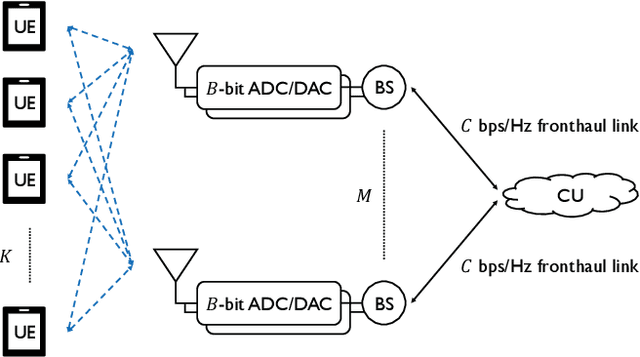
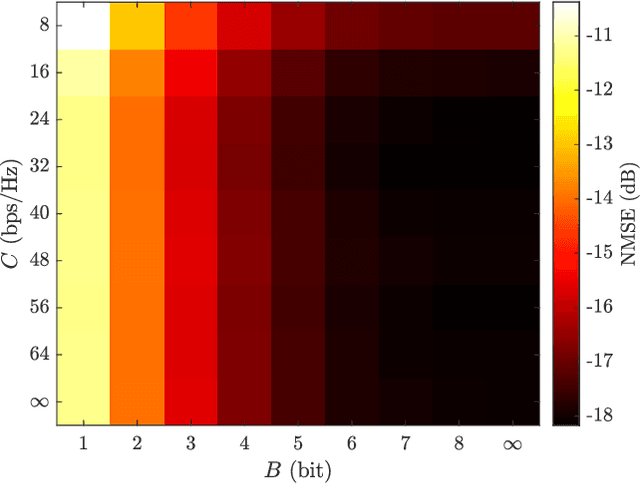
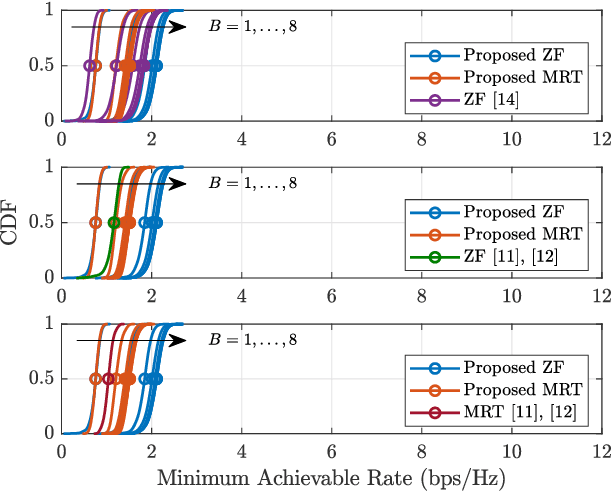
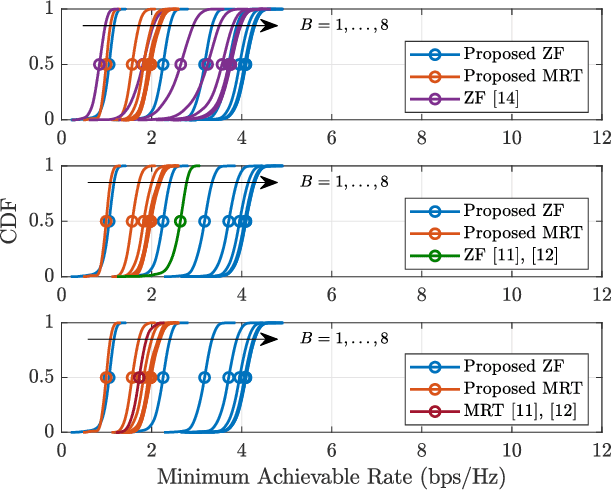
Abstract:In this paper, we consider the uplink channel estimation phase and downlink data transmission phase of cell-free millimeter wave (mmWave) massive multiple-input multiple-output (MIMO) systems with low-capacity fronthaul links and low-resolution analog-to-digital converters/digital-to-analog converters (ADC/DACs). In cell-free massive MIMO, a control unit dictates the baseband processing at a geographical scale, while the base stations communicate with the control unit through fronthaul links. Unlike most of previous works in cell-free massive MIMO with finite-capacity fronthaul links, we consider the general case where the fronthaul capacity and ADC/DAC resolution are not necessarily the same. In particular, the fronthaul compression and ADC/DAC quantization occur independently where each one is modeled based on the information theoretic argument and additive quantization noise model (AQNM). Then, we address the codebook design problem that aims to minimize the channel estimation error for the independent and identically distributed (i.i.d.) and colored compression noise cases. Also, we propose an alternating optimization (AO) method to tackle the max-min fairness problem. In essence, the AO method alternates between two subproblems that correspond to the power allocation and codebook design problems. The AO method proposed for the zero-forcing (ZF) precoder is guaranteed to converge, whereas the one for the maximum ratio transmission (MRT) precoder has no such guarantee. Finally, the performance of the proposed schemes is evaluated by the simulation results in terms of both energy and spectral efficiency. The numerical results show that the proposed scheme for the ZF precoder yields spectral and energy efficiency 28% and 15% higher than that of the best baseline.
Spatial Wideband Channel Estimation for MmWave Massive MIMO Systems with Hybrid Architectures and Low-Resolution ADCs
Jan 25, 2021
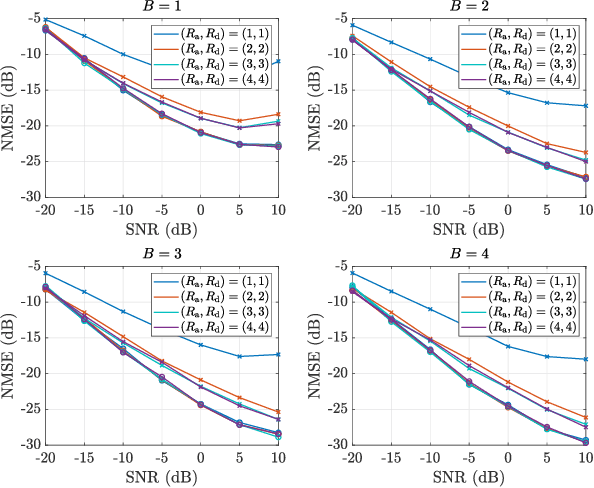
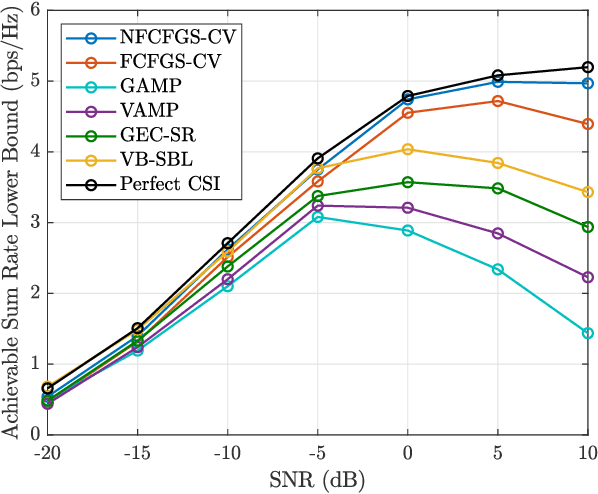

Abstract:In this paper, a channel estimator for wideband millimeter wave (mmWave) massive multiple-input multiple-output (MIMO) systems with hybrid architectures and low-resolution analog-to-digital converters (ADCs) is proposed. To account for the propagation delay across the antenna array, which cannot be neglected in wideband mmWave massive MIMO systems, the discrete time channel that models the spatial wideband effect is developed. Also, the training signal design that addresses inter-frame, inter-user, and inter-symbol interferences is investigated when the spatial wideband effect is not negligible. To estimate the channel parameters over the continuum based on the maximum a posteriori (MAP) criterion, the Newtonized fully corrective forward greedy selection-cross validation-based (NFCFGS-CV-based) channel estimator is proposed. NFCFGS-CV is a gridless compressed sensing (CS) algorithm, whose termination condition is determined by the CV technique. The CV-based termination condition is proved to achieve the minimum squared error (SE). The simulation results show that NFCFGS-CV outperforms state-of-the-art on-grid CS-based channel estimators.
Performance of Cell-Free MmWave Massive MIMO Systems with Fronthaul Compression and DAC Quantization
Jan 25, 2021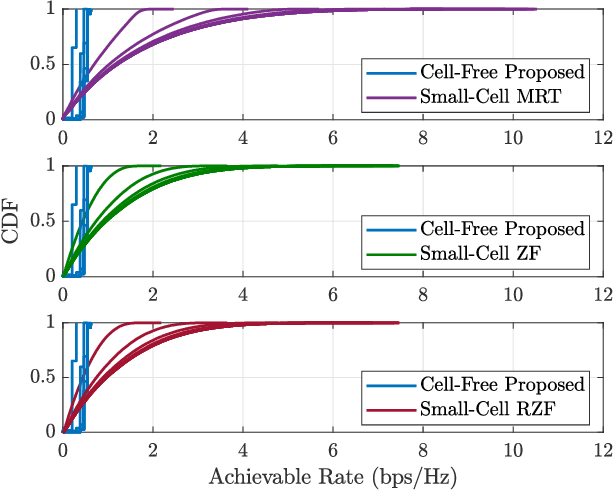
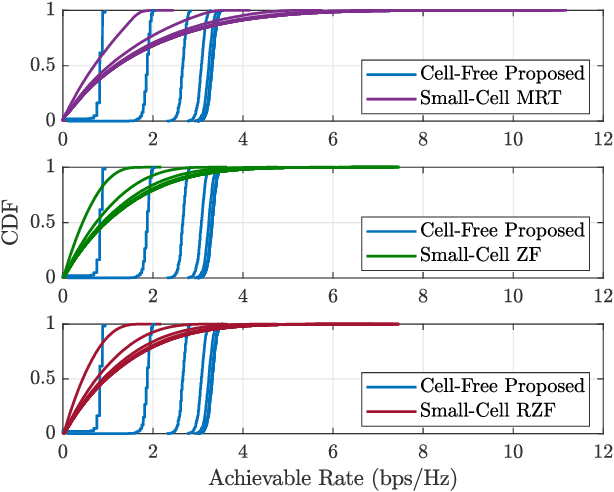
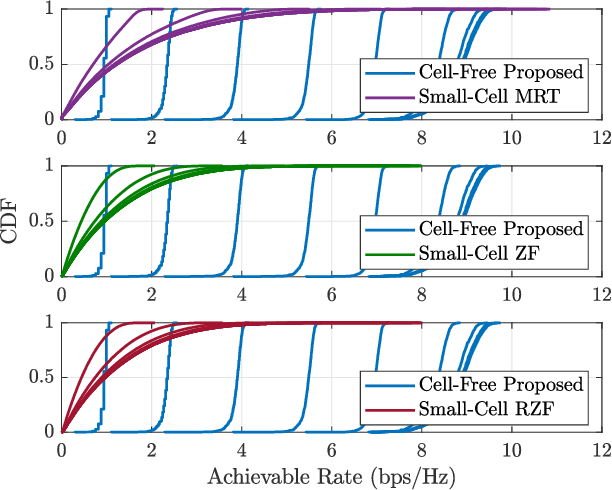
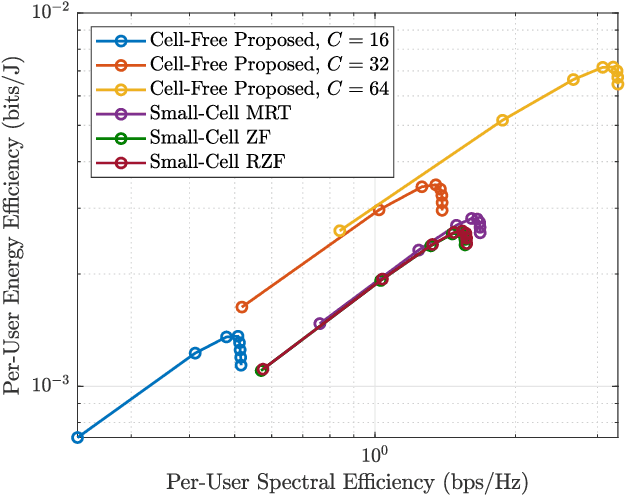
Abstract:In this paper, the zero-forcing (ZF) precoder with max-min power allocation is proposed for cell-free millimeter wave (mmWave) massive multiple-input multiple-output (MIMO) systems using low-resolution digital-to-analog converters (DACs) with limited-capacity fronthaul links. The proposed power allocation aims to achieve max-min fairness on the achievable rate lower bounds of the users obtained by the additive quantization noise model (AQNM), which mimics the effect of low-resolution DACs. To solve the max-min power allocation problem, an alternating optimization (AO) method is proposed, which is guaranteed to converge because the global optima of the subproblems that constitute the original problem are attained at each AO iteration. The performance of cell-free and small-cell systems is explored in the simulation results, which suggest that not-too-small fronthaul capacity suffices for cell-free systems to outperform small-cell systems.
 Add to Chrome
Add to Chrome Add to Firefox
Add to Firefox Add to Edge
Add to Edge